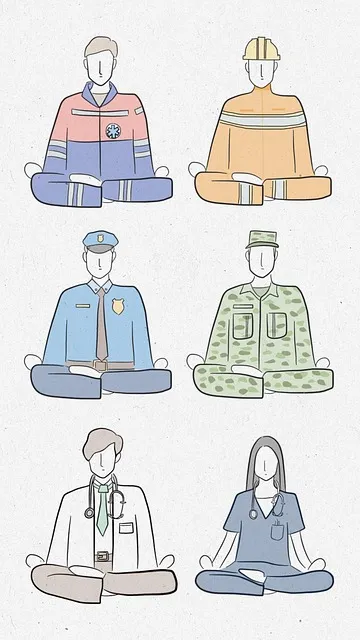Kaiser Permanente behavioral health services reviews Northglenn are integrating Resilience, Flexibility, and Mindfulness (RFM) exercises to promote holistic well-being. This approach goes beyond coping by teaching stress management, boosting self-confidence, and enhancing social interactions through tailored exercises and training. Combined with Mental Health Awareness initiatives, RFM strengthens relationships and builds community resilience. Success is measured through patient data analysis, tracking mental health improvements and stress reduction, ensuring the program's benefits can be scaled across healthcare settings.
“Discover how Kaiser Permanente Behavioral Health Services in Northglenn is enhancing patient care through Resilience-focused Movement (RFM) exercises. This comprehensive article delves into the transformative power of RFM, a holistic approach to building mental and physical resilience. We explore its role in improving patient outcomes, offering a step-by-step guide to implementation, and providing insights from Northglenn’s behavioral health services reviews. By the end, understand how RFM can revolutionize healthcare.”
- Understanding RFM and Its Role in Resilience Building
- Implementing RFM Exercises: A Step-by-Step Guide for Kaiser Permanente Behavioral Health Services in Northglenn
- Measuring Success: Reviewing the Impact of RFM on Patient Outcomes
Understanding RFM and Its Role in Resilience Building

Resilience is a critical component of overall well-being, enabling individuals to navigate life’s challenges and adapt to change. Recognizing this, Kaiser Permanente behavioral health services reviews in Northglenn have increasingly focused on implementing Resilience, Flexibility, and Mindfulness (RFM) exercises. RFM isn’t just about coping mechanisms; it empowers individuals with the tools to manage stress, build self-confidence, and foster positive social interactions.
The Role of Communication Strategies and Social Skills Training within RFM is significant. By enhancing communication skills, participants learn to express their needs and emotions effectively, leading to improved relationships and a stronger support system. Coupled with Mental Health Awareness initiatives, RFM exercises create a holistic approach that addresses both the mind and the heart, ultimately fostering a more resilient community in Northglenn and beyond.
Implementing RFM Exercises: A Step-by-Step Guide for Kaiser Permanente Behavioral Health Services in Northglenn

Implementing RFM (Resilience, Flexibility, and Mastery) exercises with Kaiser Permanente Behavioral Health Services in Northglenn involves a structured approach to enhance client resilience and overall well-being. Here’s a step-by-step guide for successful integration:
1. Assess Needs and Goals: Begin by evaluating the specific needs and goals of Kaiser Permanente Behavioral Health Services reviews Northglenn. Identify areas where RFM exercises can have the most impact, whether it’s improving coping mechanisms, managing stress, or enhancing mental flexibility. Engage with key stakeholders, including therapists, case managers, and administrative staff, to align on expectations and desired outcomes.
2. Tailor Exercises to Populations: Given that Kaiser Permanente serves diverse populations, tailor RFM activities to meet the unique needs of different client groups. For instance, exercises focusing on stress management might be particularly beneficial for those dealing with chronic conditions, while confidence-boosting strategies can empower individuals facing depression prevention challenges. Incorporate cultural competency training into the curriculum to ensure exercises are inclusive and relevant to all participants.
3. Develop a Comprehensive Plan: Create a detailed plan outlining specific RFM exercises, their frequency, and duration. Include a mix of individual and group activities to cater to different learning styles. Consider incorporating mindfulness practices, cognitive reframing techniques, and goal-setting strategies. Ensure the plan aligns with evidence-based practices and is grounded in current research on mental health resilience.
4. Provide Training and Support: Offer comprehensive training to therapists and support staff who will facilitate RFM exercises. This includes equipping them with the necessary skills to guide clients through activities, offer tailored support, and monitor progress. Regularly review and update training materials to reflect the latest advancements in behavioral health.
5. Implement and Monitor: Roll out the RFM program systematically, allowing time for adjustments based on initial feedback. Continuously monitor client progress and gather feedback to refine exercises and ensure their effectiveness. Regularly review Kaiser Permanente Behavioral Health Services reviews Northglenn to gauge client satisfaction and measure the impact of RFM implementation.
Measuring Success: Reviewing the Impact of RFM on Patient Outcomes

Measuring success is a vital aspect of evaluating the impact of RFM (Resilience, Flexibility, and Mindfulness) exercises on patient outcomes within behavioral health services, particularly at Kaiser Permanente Northglenn. By reviewing and analyzing patient data, healthcare providers can assess how these exercises influence resilience levels and overall well-being. This process involves tracking improvements in mental health, stress reduction, and burnout prevention strategies for healthcare providers themselves.
The integration of RFM into Kaiser Permanente’s behavioral health services reviews has the potential to foster a culture of inner strength development among staff members. Enhanced communication strategies can further support this initiative by promoting open dialogue about resilience-building experiences and best practices. As these initiatives gain traction, continuous evaluation will ensure that patient outcomes align with the expected benefits, solidifying the program’s long-term success in Northglenn and potentially scalable across other healthcare settings.
The implementation of RFM exercises by Kaiser Permanente Behavioral Health Services in Northglenn serves as a compelling example of how resilience-focused programs can enhance patient outcomes. By integrating these strategies, the organization has demonstrated its commitment to fostering mental well-being within the community. The positive impact on patients’ lives, as evidenced by reviews and measured success, underscores the value of RFM as a powerful tool in behavioral health services. This approach not only equips individuals with resilience but also contributes to creating a more resilient and supportive environment for all.






